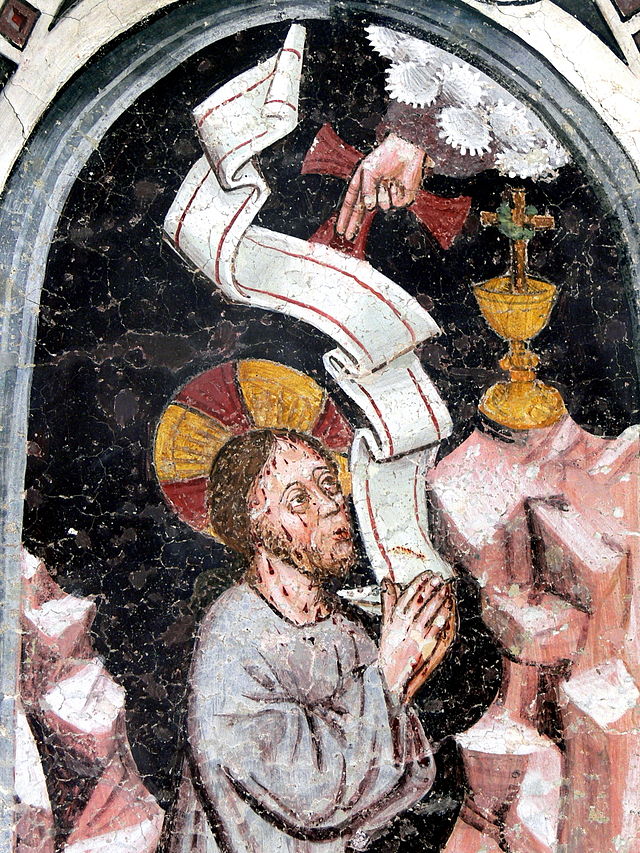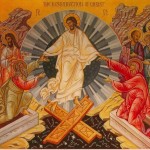You’ll be able to catch my weekly radio program, “Fights in Good Faith” streaming today at 5pm ET and tomorrow (Sun) at 1pm. And the archived audio is already up on the show page!
Every week, I put up a “Radio Readings” post, so you can track down the books, articles, songs, (and, this week, museums!) that I cite on the show. So, without further ado, here’s what I’m talking about this week.
Being Christ in the Civil Rights Marches
- This segment is prompted by a visit to the National Civil Rights Museum in Memphis, TN
- Some background on St. Maximilian Kolbe
Grotesqueries of Gethsemane
- This segment is based on the first of the Sorrowful Mysteries of the Rosary, so let me share a painting of the scene I’m discussing:

Tabernakelbildstock in Taisten. Christus am Ölberg (cc Wolfgang Sauber)
Victory is More than Not Being the Victimizer
- Once again, there’s a quote from Rebecca West’s Black Lamb and Grey Falcon: A Journey Through Yugoslavia:
It appears possible that they do not really want to succeed in that attempt; and this suspicion is often aroused by the quality of the speakers’ voices and the response of their audiences. The speakers use all accents of sincerity and sweetness, and they continuously praise virtue, but they never speak as though power would be theirs tomorrow and they would use it for virtuous action. And their audiences also do not seem to regard themselves as predestined to rule; they clap as if in defiance, and laugh at their enemies behind their hands, with the shrill laughter of children. They want to be right, not to do right.
Learning to Offer and Receive Reconciliation
- This segment primarily sourced from Fr. Henry Nouwen’s The Return of the Prodigal Son: A Story of Homecoming (recommended by Eve Tushnet as one of the best things she read last year)
- “Leading with Humility” by Eve Tushnet
That’s why it was, in a weird way, impressive to learn that [my spiritual director] actually held some stereotypes and false beliefs about homosexuality. I was struck by the humility with which he’d been able to put those aside while guiding me. He’d set aside his own expectations about what the average gay person is like, and instead focused on the individual gay person in front of him.
And here are two bits of bonus blog content — sources that didn’t wind up making it onto the broadcast, but were in the back of my head while I was putting this program together:
- “The New ‘New Orthodoxy'” by Wesley Hill
One of the rallying cries for post-Holocaust theology has been that a stoic, unchangeable God, impervious to human desolation, is no God at all. Consequently, according to Moltmann and others, the only God we can believe in now is a God who suffers, and the ancient Christian doctrines of divine simplicity, immutability, and impassibility must be discarded. But notice what happens when we question that conclusion. Driven back to the early Christian writings themselves, we may become freshly attentive to how those allegedly dangerous doctrines functioned in their original setting. Asking ourselves whether the Church Fathers intended to promote a distant, detached deity, we may become newly sensitive to the complex trajectories and repercussions of early Christian theologies.
And what do we find with that newly awakened textual sensitivity? Just this: that, far from being unconcerned about the human plight, the Church Fathers were motivated by their theology ofsalvation in upholding doctrines of divine immutability and impassibility (God’s transcendence of human suffering and passions). Their doctrines of salvation prompted their—allegedly aloof and insensitive—understandings of God.
“God’s Logos is by nature immortal and incorruptible and Life and Life-giver,” wrote Cyril. Only so is God able, through sharing our human flesh in the Incarnation, to impart eternal life to that flesh, rather than succumbing to our death and being extinguished by it. When it comes to rescuing us from death, and not merely enduring death along with us, only the impassible God can help.
- A discussion of Granny Weatherwax from Witches Abroad
“[S]he thinks you can’t help people with magic. Not properly. It’s true, too.”
“Then what good—?”
Nanny prodded at the pipe with a match.
“I seem to recall she come over and helped you out when you had that spot of plague in your village,” she said. “Worked the clock around, I recall. Never known her not treat someone ill who needed it, even when they, you know, were pretty oozy. And when the big ole troll that lives under Broken Mountain came down for help because his wife was sick and everyone threw rocks at him, I remember it was Esme that went back with him and delivered the baby. Hah…then when old Chickenwire Hopkins threw a rock at Esme a little while afterward all his barns was mysteriously trampled flat in the night. She always said you can’t help people with magic, but you can help them with skin. By doin’ real things, she meant.”











